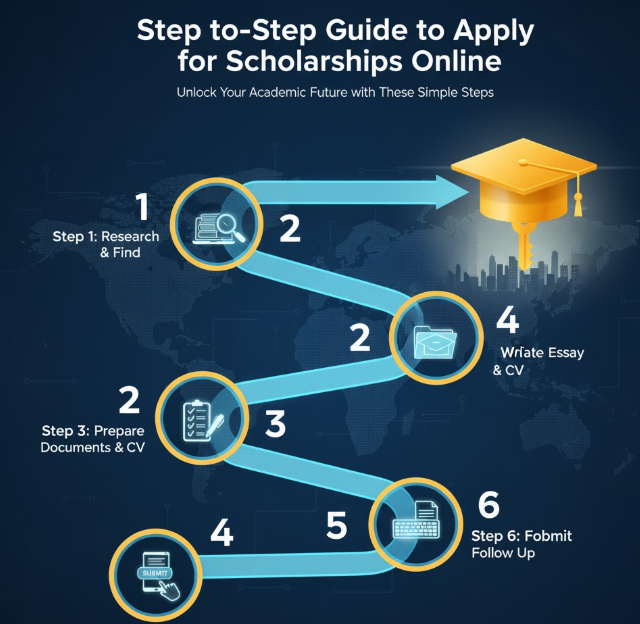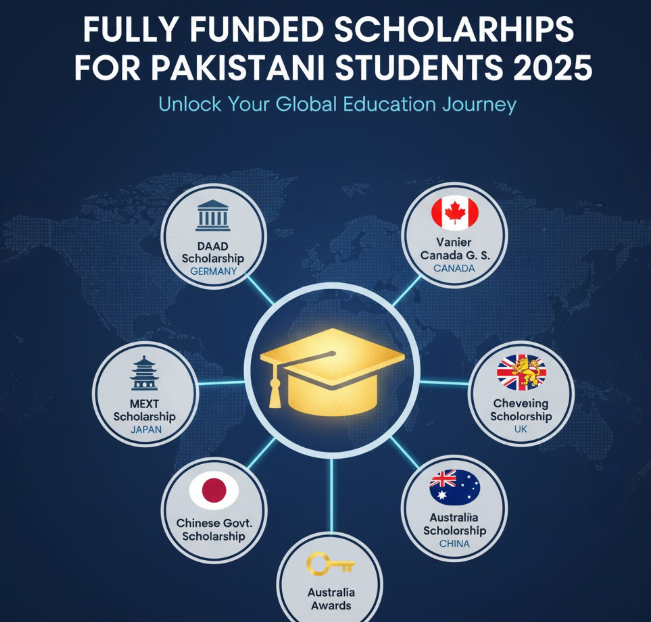Think about it: imagine you’ve got an acceptance letter from a highly rated university abroad and the best part? Tuition: You probably won’t pay a dollar. Sounds like a dream, right? For tens of thousands of students worldwide, this dream comes true every year with the aid of free scholarship programs.
Quality education overseas doesn’t always have to cost your family a fortune or involve endless debt from student loans. A number of countries around the world are welcoming international students, providing full scholarships that include tuition and lodging fees as well as sometimes a monthly payment. These opportunities exist because governments and universities understand that gifted students from all over are entitled to learn, grow and serve here.
And in 2025, the competition for such scholarships has only increased — though so have the opportunities. And no matter if you’re looking to study engineering in Germany, business in Norway or medical sciences in Sweden, there’s probably a scholarship program out there with your name on it. This exhaustive guide is a step by step process to know everything about the countries with free scholarships where they offer and what and how can you take advantage for this life-changing opportunity.
Why Do Nations Provide Free Education to Foreign Students?
Before embarking on individual countries, let’s pause for a moment and remind ourselves why governments might spend millions educating foreign students. So it’s not just generosity — there’s also smart strategy happening.
There are benefits to countries that provide scholarships free of charge. They draw the best talent from across the world and have universities with a wide range of perspectives. Many students remain after graduation, plugging skills gaps in the labor market. And still others go back home and act as goodwill ambassadors for that country, building international ties. It’s basically a bet on global talent and diplomatic input.
For students, the programs are more than free education. You’ll be immersed in new cultures, expand your international contacts, pick up new languages and earn credentials accepted across the globe. The return on investment is not just the money it saves — it’s the doors it opens for your entire career.
Germany: Europe’s Free Education Leader
Germany is one of the top locations for students looking to study free. Public universities in Germany do not charge any tuition fees at all for most undergraduate and many master’s programs, regardless of where you’re from. Yes, you read that right — free education for all.
What Makes Germany Special
German universities are world class and yet tuition free. In cities such as Munich, Berlin and Hamburg sit institutions that are ranked perennially among the best in the world. The country provides English-taught programs in many areas of study, but knowing German gives you more options and enriches your daily life.
Available Scholarship Programs
The DAAD – German Academic Exchange Service has the widest ranges of scholarships for international students. These scholarships include monthly allowances, health insurance and travel expenses. DAAD offers more than ten thousand scholarships to all levels of academic education.
Other notable programs include:
- Deutschlandstipendium for high-achieving students
- Heinrich Böll Foundation Scholarships for International Students
- Konrad-Adenauer-Stiftung scholarships with leadership focus
- Erasmus+ programs for exchange opportunities
Costs You Should Know
Tuition is free, but you will be charged a semester contribution (about €150-350) to cover administrative expenses and public transportation. Monthly costs of living are between €850 and €1200 per month, depending on your city of choice. Munich and Frankfurt are on the higher end, and Leipzig and Dresden are on the lower.
Application Timeline
Applications are typically not opened until September (for the winter semester of the following year) and March (for summer semester). DAAD scholarship deadlines are usually earlier (August – November) in order to apply for the following year.
Study Free in the Country of Fjords: Norway
In Norway, all students for both locals and internationals are granted with free education at public universities! This Nordic nation brings together a superb education system and some of the most beautiful natural landscapes in the world.
Education System Highlights
Norwegian universities are based on research and self-instruction. Class sizes are smaller than in many countries, so you get more one-on-one time with professors. Most master’s programs are in English, while bachelor’s programs generally require Norwegian proficiency.
Top Scholarship Opportunities
There are several financing options available, by the Norwegian government and different institutions:
- Full Quota Scheme, enabling people from developing countries to receive full scholarship opportunities
- Erasmus+ programs for European students
- University-specific scholarships at institutions such as the University of Oslo and Norwegian University of Science and Technology
- Research Council of Norway support for PhD candidates
Living in Norway
Norway is an expensive place to live — I’d wager probably the most expensive on this list. Monthly spending is between €1,000 and €1,500 — including lodging, food and travel. But students can work part-time (up to 20 hours per week in term time, full-time during vacations) at rates of pay that are sufficient to support themselves.
Language Considerations
There are many programs in English, but understanding Norwegian allows for more options and practical daily use. Most Norwegians have excellent English, but it’s easier to make local friends and land part-time jobs when you’ve got a grasp of Norwegian.
Sweden: Innovation Meets Free Education
Ever since, Sweden had been a country where everyone could study for free but now charges fees for non-EU/EEA students. Swedish government and universities offer scholarships that include these fees, as well as living expenses.
Scholarship Programs Worth Pursuing
The Swedish Institute provides the following scholarships:
- Swedish Institute Scholarships for Global Professionals
- University specific scholarships offered by universities such as Lund University, Uppsala University and KTH Royal Institute of Technology
- Visby Programme scholarships for students from designated countries
What’s Covered
Sweden provides full scholarships covering not only tuition fees but also living expenses, which are around SEK 10,000 per month, as well as travel grants and insurance. Focus exclusively on the studies.
Besides, Swedish universities are also at the forefront of innovative learning methods, group projects, and cooperation with the industry. They advance technology, medicine, social studies, and environmental science.
Application Process
Apply for a program at universityadmissions.se, and then for scholarships. Deadlines are usually in January for programs that begin in the fall semester, and the decisions on scholarships are made in April.
Finland: Excellence in Education
Finland is a country that charges tuition from students outside of the EU/EEA area but also offers multiple scholarship programs. A country with one of the best educational systems in the world that helps develop critical thinking and practical skills.
Scholarship Opportunities
The highest opportunity for a non-EU/EEA student for a scholarship is in university-sponsored scholarships in Finland.
Living Costs
Living costs in Finland are from €700 to €900 a month, which is mainly lower than in other Nordic countries. Student part-time jobs are allowed, and the job market is quite easy to enter for English speaking students.
Student Experience
Finnish universities offer the best student support service possible, and they are all well equipped with the newest technology. Their philosophy of easy studying, which does not consist of passing multiple specialist exams, is less stressful for students.
Austria: Affordable Education in the Heart of Europe
Austria has tuition fees, but they are among the lowest in Europe, around €1,500 a year for non-EU students. Various scholarships can cover the tuition fees and costs of living.
Austrian Scholarships
Some Austrian scholarships for foreigners are governmental scholarships for short-term studies, Austrian and Erasmus scholarships, and Ernst Mach Grants.
Austria’s wealth of culture and academics makes it an attractive destination. Cities such as Vienna, Graz and Salzburg abound in the good life of public transport efficiency and student friendliness. German language proficiency is a major asset here, but many master’s programs are taught in English.
Living Standards
Living expenses are typically between €800-€1,000 a month, which is not unreasonable for Western Europe. Student accommodation is reasonably priced and public transportation prices are discounted, making cities very accessible.
France: The Land of Culture and Opportunity
Tuition fees at state schools are low, even for international students, but there’s no such thing as an international discount for public universities.
Major Scholarship Programs
France and its institutions fund largely:
- Eiffel Excellence Scholarship Programme for Masters and PhD Students
- Émile Boutmy Scholarships — Sciences Po is offering the Émile Boutmy scholarship for international students
- École Normale Supérieure international awards, France
- Scholarships from Campus France connecting students to a variety of programs
Education Quality
French universities and grandes écoles have very rigorous academic standards. The country ranks at the top in disciplines such as engineering, business and even in arts and humanities. More international students live in France than any other non-English-speaking country.
Language and Integration
While there are plenty of English-taught programs, your experience is all the richer when you speak French. Free to very low-cost French classes for international students are available in France which greatly assists with integration and future job possibilities.
Turkey: The Bridge Between the East and West
Turkey is now a favorite study destination under the Türkiye Scholarships programme, providing all-round support to foreign students.
Türkiye Scholarships Program
The scholarship offered by the government is a full scholarship that will include:
- Complete tuition fees
- Monthly stipends (around $200-300)
- Accommodation in dormitories
- Health insurance
- One-year Turkish language course
- One round-trip airfare
Academic Opportunities
Turkey has variety of programs in its top universities — Boğaziçi University, Middle East Technical University and Istanbul Technical University. The country uniquely straddles both European and Asian cultures.
Application Process
The application window opens each year in January, and you can choose from thousands of scholarships for students at every level. They are based on a competitive but open, academic merit, motivation and potential-based selection process.
Belgium: Small Country, Big Opportunities
Students in Belgium study high-quality education at affordable fee rate, and can receive from the different scholarship funds. In some provinces, notably Flanders, there is free or virtually free tuition in certain programs.
Scholarship Options
- VLIR-UOS Scholarships for students from the Global South
- Master Mind Scholarships to outstanding students
- University funding at KU Leuven, Ghent University and others
- Erasmus Mundus Joint Master Degrees
Benefits of Studying in Belgium
Due to Belgium’s central location in Europe, traveling to other European countries is convenient and economical. The country is officially trilingual at the national level in Dutch, French, and German. Belgian universities focus on international cooperation and practical skills.
Czech Republic: Hidden European Gem
Education in Czech language is free of charge, and there are a lot of English-taught programs for reasonable fees as well as different kinds of scholarships.
Scholarship Programs
- Czech Government and Charles University Scholarships for Developing Countries
- Erasmus+ programs
- Visegrad Fund scholarships for citizens of certain countries
- Scholarships of universities Charles University Czech Technical University
Living Affordably
The cost of living is really low compared to the one in western Europe — €400-700 a month — and so it makes possible to afford our own rent, food etc. The country is a great value — the quality of education you’ll receive, in a picturesque and historic location, won’t bankrupt you.

Comparison Overview: Scholarships and Grants
| Country | Tuition for Public Universities | Major Scholarship | Monthly Living Cost | English Courses Available |
|---|---|---|---|---|
| Germany | Free | DAAD | €850-1,200 | Extensive |
| Norway | Free | Quota Scheme | €1,000-1,500 | Many (Master’s) |
| Sweden | Paid (Non-EU) | Swedish Institute | €900-1,300 | Extensive |
| Finland | Paid (Non-EU) | University Scholarships | €700-900 | Many |
| Austria | Minimal (€1,500/annum) | OeAD | €800-1,000 | Moderate |
| France | Low (€170-600/annum) | Eiffel Scholarship | €800-1,200 | Growing |
| Turkey | Paid | Türkiye Scholarships | €400-600 | Expansive |
| Belgium | Varies | VLIR-UOS | €800-1,100 | Many |
| Czech Republic | Free (in Czech) | Government Scholarships | €400-700 | Moderate |
How to Successfully Submit Applications for Free Scholarships
Good grades won’t necessarily win a scholarship. Here’s what really works when you’re applying.
Start Early and Research Thoroughly
Start researching at least 18 months before your desired start. Various scholarships are due at different times and it takes time to create strong applications. Compile a spreadsheet of the schools you will be applying to, the specific programs and their admissions requirements, as well as deadline dates.
Build a Strong Academic Profile
Most scholarships will ask for good academic records, although don’t despair if your grades are not perfect. Many programs weigh potential over all. Focus on:
- Maintaining consistent academic performance
- Participating in relevant extracurricular activities
- Garnering work or volunteer experience as it relates to your field
- With courses or projects that build the necessary skills
Craft Compelling Application Materials
Your Personal Statement or Motivation Letter is paramount. Don’t try to say something universally applicable. Instead:
- Tell your own story and spell out your motivation
- Relate past to future implications
- Demonstrate a knowledge of the program and university
- Describe how this potential is consistent with your long-term professional goals
- Be yourself — committees can sniff out phony eagerness
Secure Strong Recommendation Letters
Select recommenders who know you well and can cite examples in support of your abilities. Skip the most famous professor who barely knows you. Give recommenders:
- At least 4-6 weeks notice
- About the scholarship and your ambitions
- Any particular points you’d like them to forward
- Clear submission instructions and deadlines
Prepare for Interviews
Many competitive scholarships include interviews. Practice common questions like:
- Why do you wish to study in this country?
- How do you expect this scholarship to assist you in your financial needs?
- How will you contribute to the university?
- What will you do when you graduate?
Practice with friends, or mentors, but let your responses be natural rather than learned by heart.
Common Application Pitfalls to Stick Clear Of
It saves time and improves your odds in not repeating other people’s mistakes.
Missing Deadlines
This may seem obvious, but failing to meet deadlines cuts you immediately. Schedule reminders several weeks before deadlines would be imminent. The key is to make sure you apply at least a couple of days early to avoid any last-minute technical problems.
Applying Without Meeting Requirements
Read eligibility criteria carefully. Also: you are wasting everyone’s time with the applications for programs that aren’t even open to people who aren’t eligible. If you have any doubts as to your eligibility, we recommend that you contact the scholarship provider for clarification.
Submitting Generic Applications
One-size-fits-all applications with the same generic materials are rarely effective. Customize each application for the scholarship and school it’s going to. Prove that you researched and know what makes that program special.
Ignoring Language Requirements
Many scholarships need a language certificate (TOEFL, IELTS, TestDaF…). These tests require time to prepare for and register for. Look into prerequisites in advance and plan tests accordingly.
Underestimating Living Costs
Even if you get full tuition, though, you need living expenses. Do some research into real costs in the city you want to go live in or study and see if you can make that feasible with scholarships, savings and part-time work.
Life as a Foreign Studies Grantee
Knowing what life will be like enables you to prepare both mentally and practically.
Adapting to New Education Systems
Teaching methods are very different from country to country. European universities tend to value independent learning and self-motivation over constant oversight. You’ll be more free, but you also will have to take more responsibility for your learning.
Managing Finances
It’s budget that really matters when it comes to scholarships. Keep track of costs, cook at home when you can, and take advantage of student discounts — and stay away from lifestyle inflation. The majority of scholars have part-time jobs to help with both income and interaction with local culture.
Building Social Networks
Building friendships requires work, particularly in new cultural circumstances. Get involved in clubs/organizations, go to school events and games, explore your interests, and be open to meeting people of all walks of life.
Dealing with Homesickness
Homesickness is completely normal, especially in the very beginning. Video call family, but also soak up your new environment. Seek out communities of people from your country who are also students, but don’t restrict yourself to such affiliations.
Make the Most Out of Your Opportunity
Now is not about the degree. When in doubt, travel, learn the language of your host country and its culture (an education can never be wasted), try new things, volunteer for causes that could use your talents, attend cultural events and grow an international information base. These were the defining moments in your life, that now form the way you see the world and even what future opportunities are available to you.
After Graduation: Post-Study Opportunities
Many nations that give scholarships also offer post-graduate opportunities to remain.
Germany gives graduates 18 months to find a job. There is a good economy and skills shortages are being faced in variety of fields, so hope to find job should be realistic.
In Norway and Sweden, residence permits for job hunting are common, usually for between 6-12 months. Both countries also have shortages of technology, engineering and health workers.
A one-year residence permit is available to job-seekers in France. Working knowledge of the French language greatly increases job opportunities.
Turkey is becoming particularly open for graduates with the right skills especially in emerging areas such as technology and engineering.
Check the post-study work regulations early as this may affect your country of choice. Establishing networks in the local areas while still a student makes searching for employment much less daunting.

Frequently Asked Questions
Can I apply for more than one scholarship at the same time?
Absolutely! In fact, you should be applying for multiple programs to increase your chances! Just be sure you are person enough to keep all those plates spinning and satisfy each program’s demands. Some scholarships have provisions regarding the simultaneous holding of multiple awards, so read the terms closely.
Must I have fluency in the language spoken where I wish to study abroad?
This varies depending on the country and program. Many universities offer English-based programs, in particular at the master level. But speaking the local language will drastically improve your quality of life, increase your employment opportunities, and make daily life easier. Language classes for such students are free in the majority of countries.
What if I don’t have perfect grades — can I still get a scholarship?
Yes! Even though strong academic records matter, a lot of scholarships apply other criteria: leadership, community service, work experience, motivation and potential. A few programs cater to students from underprivileged backgrounds or underserved disciplines. Instead of concentrating on the lack of some quality or the presence of another, make sure that your entire application is a solid one and showcases what you have to offer.
How much money should I save to move abroad?
Even with a full scholarship, keep at least 2-3 months’ worth of living expenses (minimum €2,000-€3,000). Initial costs comprise of deposits, initial grocery shopping, books and settling-in costs. Scholarships often are paid after you arrive, so savings bridge the gap.
Can my family come visit me while I’m studying abroad?
Yes, but the visa you have is not valid for their time there. Family members must go as tourists. Some countries allow the dependents of scholarship students to join in it, but you will generally have to demonstrate financial ability to support them and your scholarship amount may not be enough to also cover family members.
How easy is it for international students to get part-time work?
This will depend on the country and your language skills. There are better part-time job markets for English speakers in Germany, Netherlands and the Nordic countries. Seek work on campus, with international companies or other English-speaking jobs such as at a restaurant in a tourist area. Being able to converse in the local language greatly expands your choices.
What if I fail a class or need to take an extra semester?
Scholarship conditions do differ, but generally require one to sustain adequate academic progress. One failed course is not going to be the end of the world, but multiple failures could impact your scholarship. There may be an extension due to legitimate reason (i.e. health issues, family emergencies). ALWAYS notify your scholarship provider right away if issues come up.
May scholarship students bring their spouse or children?
There are some Scholarships with something for dependents (definitely the ones chasing PhD students). But in most bachelor’s and master’s scholarships, dependents aren’t covered. You can also take family members if you are able to prove your own financial capability to support them independently. Check for scholarships and visa regulations for dependents.
Conclusion: Your Roadmap Begins Today
Going to school abroad on a free scholarship isn’t just about saving money – it’s about changing your world for the better. It will provide you with world-class education, international contacts and increased independence as well as a different view of the world. These experiences don’t just define your career; they define you as a human being.
At first the process may be daunting. You’ll spend hours researching programs, writing applications, finding documents and waiting for decisions. There will be times when you doubt, when you feel frustrated. But you shouldn’t forget that thousands have also taken the same path — and found success. Most of them began with the same questions and fears you have today.
All the countries and programs we’ve listed in this guide are legitimate options for students from any corner of the globe. They’re not private clubs for a few lucky rich kids — they are designed to recruit talented, motivated kids in spite of financial background. Your task is to represent yourself, put forth a case as to what you will add and bring to their academic community.
Start today. Select two or three countries that appeal most. Look into their best universities and scholarship facilities. Check eligibility requirements and deadlines. Start your application documents. It’s gradual time & hard work that add up to a permanent change.
Your future is waiting. These opportunities are there because the world needs bright, diverse brains to go work on tomorrow’s problems. That includes you. It’s not whether you deserve these opportunities, it’s whether you will take whatever steps are necessary to pursue them.
The best countries that offer free scholarships in 2025 have their arms wide open waiting for you. And it’s your time now to grab these amazing opportunities! Begin your research, work on your applications and start the first day of an incredible educational adventure. Your story begins now.




